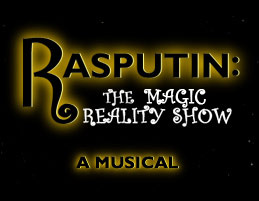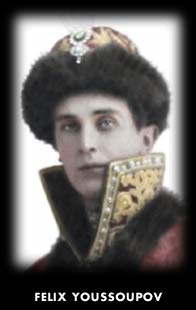 |
 |
 |
|
 |
 |
|
Loosely framed on a parody of a modern TV Reality show, " Rasputin" tells a fable of hope and defeat, comedy and corruption in a world in which "cheating souls" unwind in "double-time." Beneath this cynicism is a story about both loss of innocence and the power of innocence. Each theme is reflected in the two main threads of the plot: the tragicomic story of Rasputin's fall from grace and the cabaret-like farce that surrounds and distorts this inner drama - a theme-show circus of media manipulation in the telling of history. Was Rasputin an evil villain, a hero trying to save Russia, or something in between? Reading history - everyone has a different view. His daughter, Matriona, wrote two books of unabashed praise. His assassin, Felix Youssoupov (pictured above), helped to create the halo of evil surrounding him. Journalists accused him of being a German spy. And yet nobody could explain his powers, or accept his odd mix of liberal and medieval views. What really happened? This is a musical fable.
|
Decide for yourself. Not only do no two characters view Grigori Rasputin the same way, but virtually no two books or historical accounts do either. While this is a MUSICAL FABLE, in which we made some compromises with history to tell our story, we did draw significantly from history. Four out of the many sources available in English stand out as good reading. The last reference is not generally available, but also worth mentioning.
|
 Not
everyone has a chance to revisit their lives to seek a new
verdict on how they lived - but
in this show, Grigori Rasputin and his assassin, Prince Felix
Youssoupov do. The results replay history with ironic and unexpected
twists.
Not
everyone has a chance to revisit their lives to seek a new
verdict on how they lived - but
in this show, Grigori Rasputin and his assassin, Prince Felix
Youssoupov do. The results replay history with ironic and unexpected
twists.